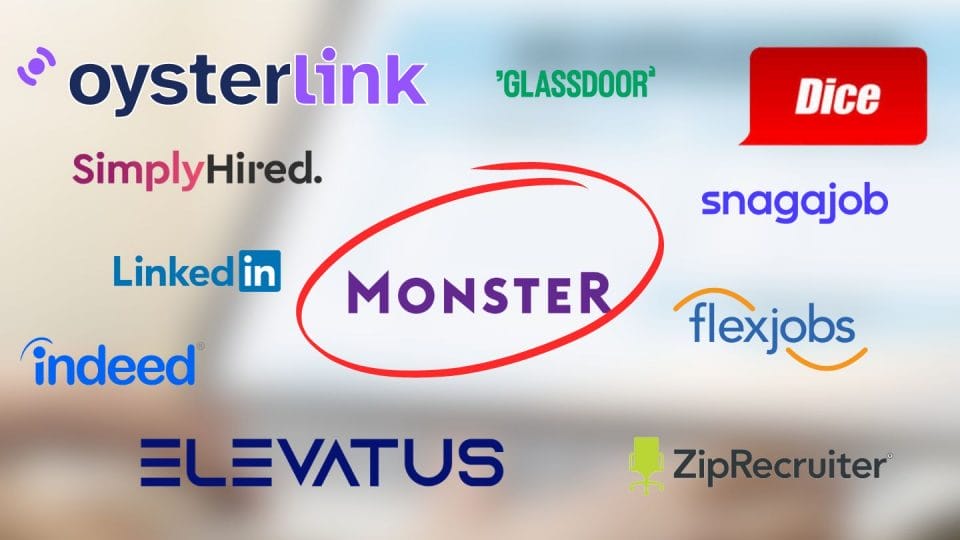Monster.com was launched in 1994 and it quickly became popular because of how innovative it was in its time. Nowadays, it’s still a well-known platform that users love for its large pool of candidates, extensive job listings and valuable resources such as career advice, resume tips and interview guides.
However, there are now countless Monster alternatives that help with hiring and job hunting, particularly in the hospitality industry, and here are the best of them.
Monster Alternatives
| Platform | Price | Hospitality industry focused? | Offers access to skill development resources? |
|---|---|---|---|
| Monster | $299 per month | ❌ | ✅ |
| OysterLink | FREE | ✅ | ✅ |
| Glassdoor | Limited free job postings available | ❌ | ✅ |
| Indeed | Free posting/paid boost visibility | ❌ | ✅ |
| SimplyHired | Free posting/paid boost visibility | ❌ | ❌ |
| Dice | $495 per post | ❌ | ✅ |
| ZipRecruiter | $24 per post per day | ❌ | ✅ |
| Can range from $1,000 to $2,000 for sponsored ads | ❌ | ✅ | |
| Snagajob | $89 per job per month | ❌ | ✅ |
| Flexjobs | $2,999 per year | ❌ | ✅ |
| Elevatus | Starts at $200 | ❌ | ❌ |
What Is Monster.com?
Monster, also known as Monster.com, was created to consolidate all job openings published in newspapers into a single online platform.
Today, it remains one of the go-to job search engines, helping employers across multiple industries find talent.
Its Monster+ Pro subscription plan, which costs $299 per month, allows employers to reach a wide audience by advertising job openings on the Monster website, as well as through its network of job boards and partner sites.
The platform is free to use for job seekers, offering access to a comprehensive library of resources and skill assessment tests to help land jobs, identify areas for improvement and advance in their careers.
What Are Monster Alternatives?
1. OysterLink
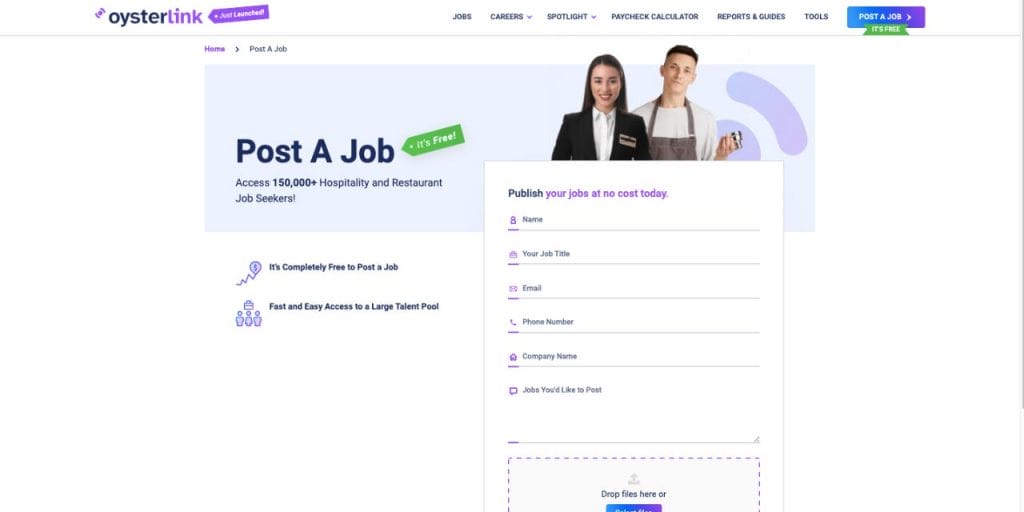
OysterLink is a new job search platform designed to address the hospitality industry’s high turnover rate.
It offers resources that outline potential career paths within the hospitality sector, helping candidates understand opportunities for growth within the industry.
OysterLink also provides recommendations on certifications, training and formal education that hospitality professionals can pursue to develop skills and enhance job satisfaction.
The platform features job listings catering to all experience levels, allowing employers to quickly find candidates suited for roles in events, food and beverage and hotel sectors, from entry-level to director-level.
OysterLink pricing:
OysterLink is FREE for both employers and job seekers.
For employers:
Since OysterLink is tailored specifically for the hospitality industry, employers can automatically connect with candidates who have relevant experience.
In addition to accessing a pool of qualified candidates, OysterLink provides resources for creating compelling job descriptions and offers a Paycheck Calculator to help generate payroll calculations for employees.
For job seekers:
OysterLink gives job seekers access to top job postings from reputable companies, helping them find positions that enhance their skills and offer fair compensation.
The platform also provides salary insights, allowing job seekers to understand their market value, the factors influencing their salaries and tips for increasing their take-home pay.
Pros:
- Extensive library of resources for employers and job seekers
- Focused on hospitality
- Free for both empoyers and job seekers
- User-friendly design
Cons:
- New to the industry, so the user base isn’t as extensive as Monster’s
2. Glassdoor
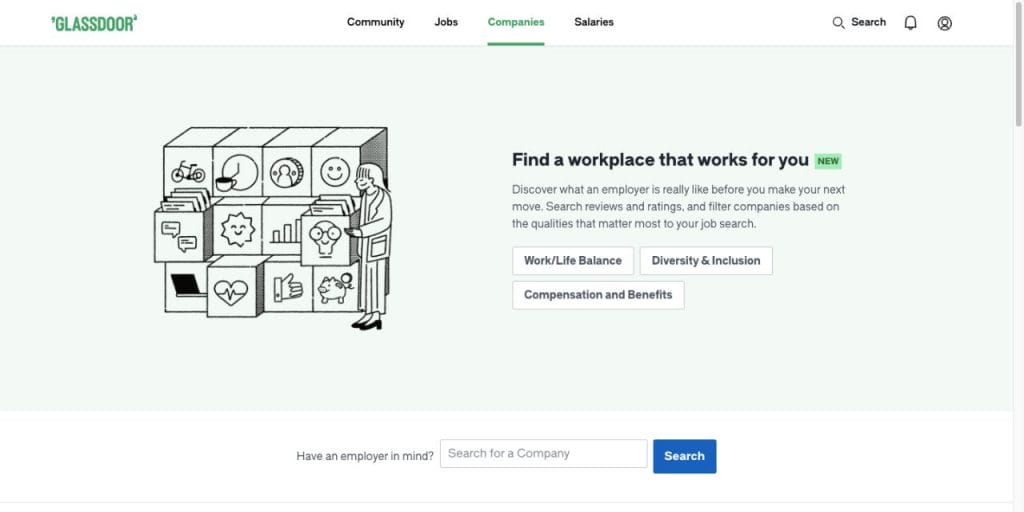
Glassdoor was launched in 2008 with the mission to promote transparency by sharing company reviews and salary information. It was later acquired by Recruit Holdings, Indeed’s parent company, in 2018 and is now one of the biggest job and recruiting sites worldwide.
Glassdoor pricing:
Employers can post up to ten jobs for free for seven days.
For employers:
Using Glassdoor allows employers to create a strong profile that highlights what makes them a great place to work.
According to statistics, 77% of job seekers review a company’s culture before applying. This makes it important for employers to showcase their values, work environment and employee satisfaction to attract candidates who align with their organizational principles.
For job seekers:
Glassdoor jobs can be browsed by company rating, salary range and work setup. This allows job seekers to filter roles based on factors that matter most to them.
Job seekers can use all the resources and tools available on Glassdoor for twelve months, after which they may need to upgrade to a paid plan to maintain access to detailed information regarding company reviews, salaries and interview experiences of previous candidates.
Pros:
- Glassdoor salaries provide comprehensive information and pay estimates for the same position across different companies
- Broad reach of job listings and applicants
Cons:
- Glassdoor reviews are anonymous, which can lead to potentially false information
- Non-transparent pricing for employers and job seekers
3. Indeed
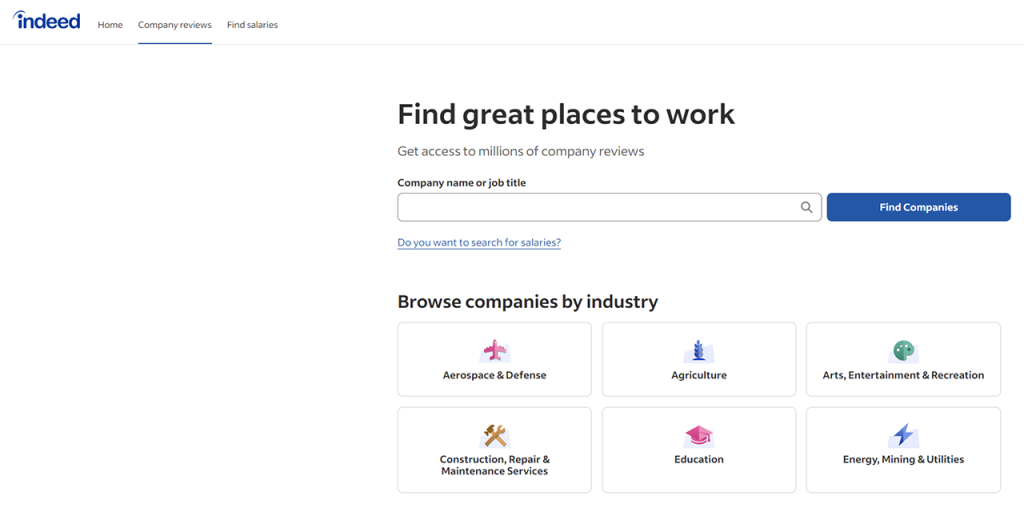
Indeed is a global job search engine that allows job seekers to search for openings across various industries, locations and job types.
Indeed pricing:
Employers are encouraged to use sponsored ads to boost job ad visibility, starting at $5 per day.
For employers:
Indeed provides employers with tools that streamline the hiring process.
When posting a job, employers can add skill tests to easily screen for qualified candidates. This saves time by filtering out applicants who don’t meet the basic requirements.
The platform’s dashboard allows employers to edit job postings, customize visibility, sort candidates based on set criteria and track metrics to evaluate the effectiveness of their job ads and adjust strategies as needed.
For job seekers:
Indeed offers a wide range of resources for job seekers. They can read company reviews, research salaries for similar positions and access career advice to advance in their careers.
Job seekers can also set up email alerts for new jobs postings that align with their skills, ensuring they don’t miss opportunities.
Pros:
- User-friendly interface
- One-click apply feature
- Large pool of employers and job seekers
Cons:
- Job duplicates due to its connection with SimplyHired, which can be confusing
- High volume of applicants makes it challenging to get to the interview stage
- Employers often need to pay for increased job ad visibility to stand out
4. SimplyHired
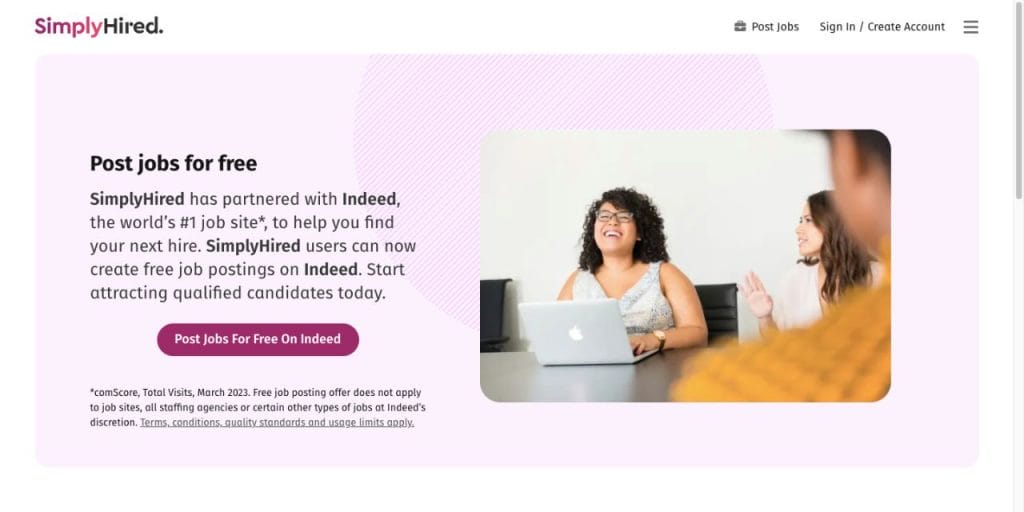
SimplyHired is Indeed’s publishing partner. This means all job postings on Indeed are also reflected on SimplyHired’s job board.
SimplyHired pricing:
Employers and job seekers can use SimplyHired for free. The platform charges employers only when they decide to contact a candidate or if they choose to boost their ad for better visibility.
For employers:
SimplyHired’s interface is user-friendly and intuitive.
The platform also has a candidate management tool, enabling employers to sort and rate applications easily, reducing the need for external tools. This not only saves time but also resources as it centralizes all candidate interactions, from initial application to final hiring decisions in one location.
For job seekers:
It’s useful for job seekers who want deeper insights into potential employers. They can browse SimplyHired jobs by company name to see reviews from past employees.
In addition, job seekers can explore top job titles and view average salary information to help them decide which position to pursue.
Pros:
- Access to salary data and company reviews
- Wide pool of candidates and employers
Cons:
- While job posting is free, employers likely need to spend money on sponsored posts to get quality candidates
- Job listings overlap with Indeed
5. Dice
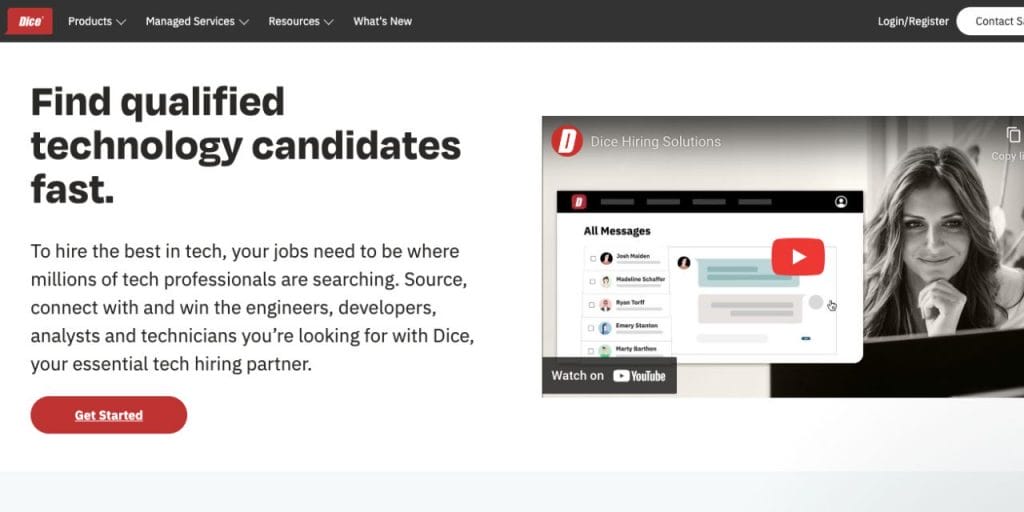
Dice is a job search engine specifically for the tech industry. It uses AI to help employers find talent that meets their requirements.
Dice pricing:
Posting a job on Dice costs $495 per listing.
For employers:
Dice offers several features to help employers find qualified candidates within seconds. One of these features is Intellisearch, which allows employers to copy and paste their job description or an ideal resume into the system, enabling it to find relevant candidates. This helps Hiring Managers save time by eliminating the need to manually search through resumes for potential candidates.
In addition, Dice is compatible with a number of Applicant Tracking Systems (ATS), helping employers organize, track and evaluate applicants efficiently.
For job seekers:
Dice provides job seekers with opportunities to connect directly with employers through career events.
The platform hosts both virtual and in-person events where job seekers can interact with employers through text or video chat. When a job seeker registers to an event, they can upload their resume and learn more about companies and open roles.
Dice also offers an extensive library of resources, including career advice, job-hunting tips and interview guides to help job seekers succeed in the tech industry.
Pros:
- Advanced tools to help employers find qualified candidates quickly
- Extensive resources for job seekers in tech
- Allows employers to host career events
Cons:
- Expensive compared to other job platforms
- Exclusively for the tech industry
- User interface isn’t as intuitive as other job search engines
6. ZipRecruiter
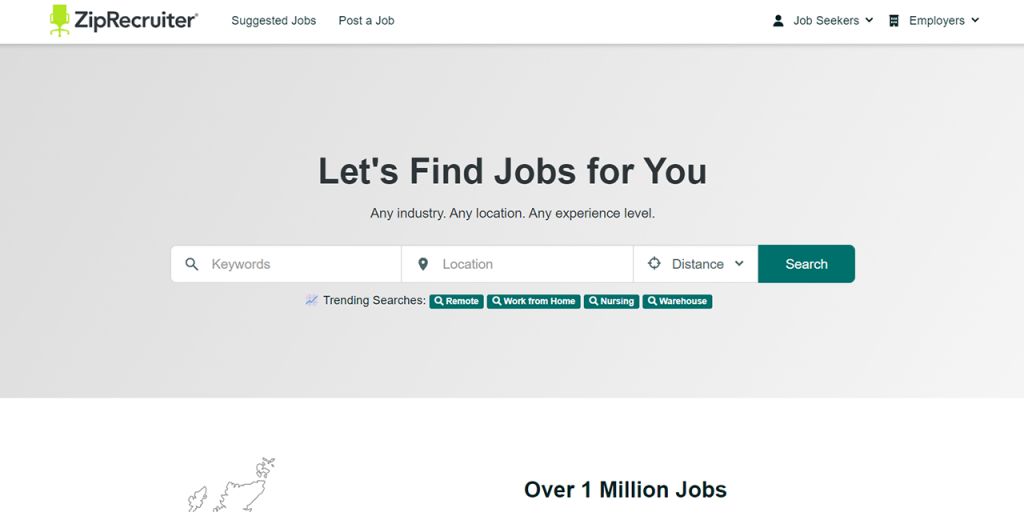
Similar to Monster, ZipRecruiter is a job search engine that quickly became popular for its comprehensive job listings across various industries.
ZipRecruiter pricing:
Posting a job on ZipRecruiter costs $24 per day.
For employers:
ZipRecruiter uses AI to help employers sift through millions of resumes and recommend candidates that fit their needs. It also offers free job description templates, saving Hiring Managers time.
Once a job description is posted, ZipRecruiter forwards it to a network of over 100 job sites to maximize visibility.
For job seekers:
The platform provides endless job opportunities that can be browsed and applied to using a mobile phone. With its one-click apply button, job seekers can submit resumes quickly and efficiently.
ZipRecruiter also offers comprehensive salary data, empowering job seekers to ask for a compensation package that matches their needs.
Pros:
- Has a mobile app
- Large base of employers to connect with
Cons:
- The AI algorithm may suggest irrelevant candidates for open positions
- Can be expensive
- Offers a free account but has limited features
7. LinkedIn
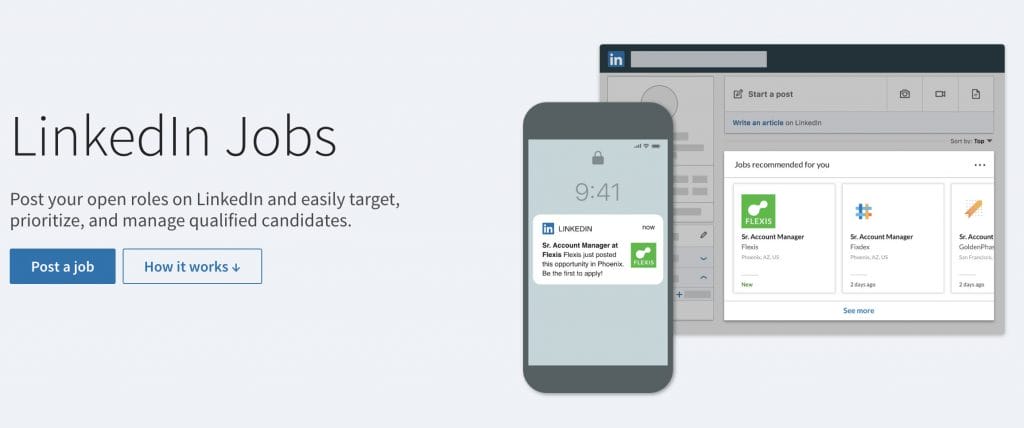
LinkedIn is a social media platform that allows job seekers to connect with industry professionals, network and improve their skills through free and paid courses. The platform also enables users to organize in-person events, join groups and post content.
LinkedIn pricing:
You only get to post one job for free on Linkedin. Additional job posting fees can range between $1,000 to $2,000 depending on placement, ad format and industry type.
For employers:
LinkedIn helps employers find qualified candidates with its advanced search filters and intelligent matching. Employers can filter for entry, mid or senior-level positions, as well as by location to avoid candidates who aren’t local or unable to commute.
Employers can use LinkedIn’s premium tools, such as InMail, to contact candidates directly. Additionally, LinkedIn’s insights give hiring teams valuable data on talent pools, helping them target specific groups and enhance their recruitment strategies.
For job seekers:
LinkedIn allows job seekers to showcase their professional achievements with a comprehensive profile that includes work experience, skills, and endorsements from colleagues.
By optimizing their profiles with a professional photo, a compelling headline, and relevant keywords, candidates increase their chances of being found by recruiters.
LinkedIn jobs can be browsed by title, location and work setup.
Pros:
- Provides opportunities for job seekers and employers to connect
- Offers a vast array of resources to help job seekers improve their skills
- Flexible plans for employers
Cons:
- Can be overwhelming due to the sheer number of features and options available
- Can be expensive
- Potential for spam messages due to its networking nature
8. Snagajob
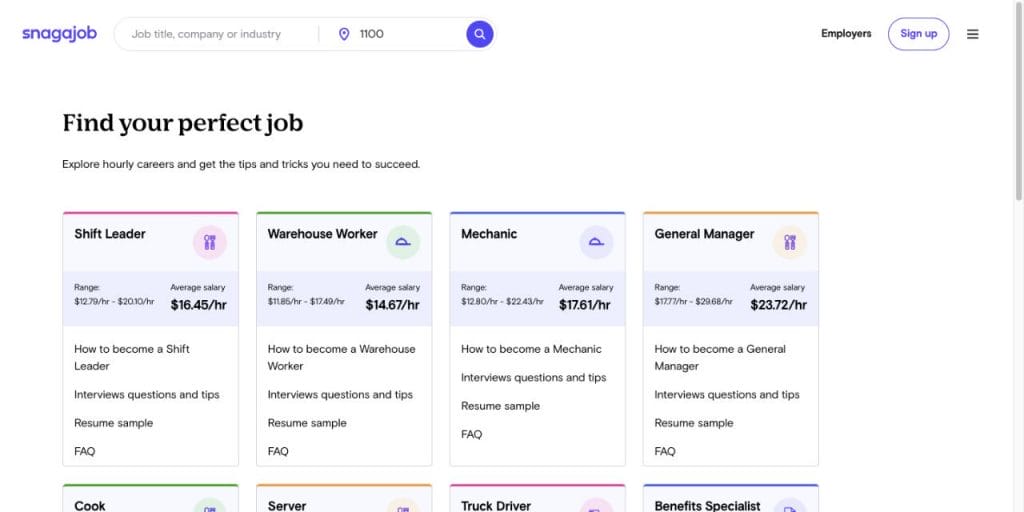
Snagajob is a search engine specifically designed for hourly workers in the United States. Since its launch in 2000, it has gained nearly four million monthly active job seekers in the hospitality, healthcare and transportation industries.
Snagajob pricing:
Advertising on Snagajob starts at $89.
For employers:
Since Snagajob focuses on hourly workers, it’s an ideal job search platform for professionals in the service industry. It offers customized pricing plans for both small business owners and enterprises.
For job seekers:
Snagajob has a mobile app, a user-friendly interface and an easy-apply feature to help job seekers find and apply to shifts quickly.
In addition, it provides extensive resources, such as career advice, job search tips and interview guides to help job seekers increase their chances of securing offers.
Pros:
- User-friendly interface
- Simplifies the application process for job seekers
- Provides employers with tools to easily manage applicants
Cons:
- Not ideal for hiring senior or managerial-level positions
- Can be expensive
- Limited to part-time job seekers
9. Flexjobs
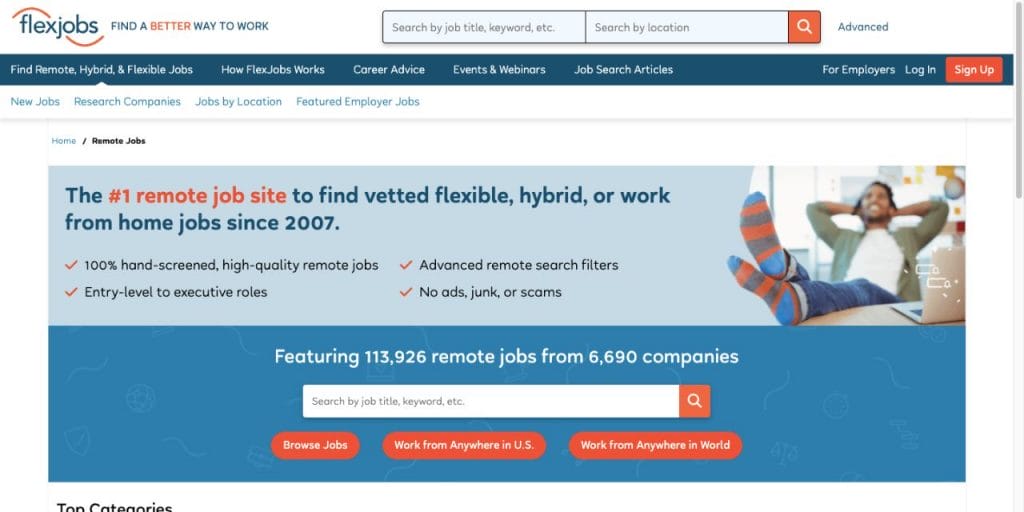
Flexjobs is a job board that focuses on advertising remote and flexible jobs across different industries, including hospitality, event planning and retail.
Flexjobs pricing:
The pricing plan for employers starts at $399 per month. For job seekers, a one-week plan costs $9.95.
For employers:
The platform offers ATS integration, allowing Hiring Managers to streamline recruitment by automating tasks, improving collaboration among decision-makers and adjusting recruitment strategies through data insights provided by its dashboard.
For job seekers:
Flexjobs addresses the problem of scam job listings by ensuring that every job posted on their platform is quality-checked. This helps job seekers focus on real opportunities and make use of the platform’s webinars, job listings and articles to help them land remote positions.
Pros:
- Provides advice for employers on remote work culture, hiring and branding
- Job seekers can trust that listings are legitimate
Cons:
- No free plan for either job seekers or employers
- Limited job opportunities for those seeking career advancement or comprehensive employee benefits
- Limited visibility due to the flexible nature of the advertised positions
10. Elevatus

Elevatus is a recruitment software that uses AI to help companies streamline their hiring process, from filing staffing requests to onboarding new hires.
Elevatus pricing:
The pricing plan starts at $200.
For employers:
Elevatus offers AI solutions that automate manual tasks such as filtering resumes and scheduling interviews, speeding up the hiring process.
One of its standout features is the option for prerecorded video interviews. Hiring Managers can set specific criteria, such as required skills or qualifications and candidates are prompted to record their responses to predetermined questions at their convenience.
This allows Hiring Managers to review candidates’ answers without the need for live interaction, making it easier to assess whether candidates meet basic qualifications before moving them to the next stage of recruitment. This eliminates the back-and-forth of coordinating interview schedules and reduces administrative work.
For job seekers:
Elevatus is specifically for employers. It’s not a traditional job board like Monster. However, those applying to companies using Elevatus can benefit from the software’s flexibility and convenience in conducting interviews.
Pros:
- AI technology solves many hiring challenges, such as time spent on screening and interviews
- Provides insights into hiring metrics, enabling Hiring Managers to adjust recruitment strategies
- Advanced technology can leave a positive impression on candidates because of its convenience and modern approach
Cons:
- Can be expensive for smaller businesses or startups
- Limited integration with other HR software
- Steep learning curve for Hiring Managers unfamiliar with AI tools
Post a Job on OysterLink for Free
You can find the best hospitality talent with OysterLink. The simple, no-fuss job posting process allows you to find candidates quickly and easily. OysterLink also offers free job description templates to help you find the ideal candidate.
Connect with more than 150,000 hospitality professionals for FREE today.

Written by Rea Gierran
With a background in Communication Arts, Rea’s expertise lies in content marketing and copywriting. Her published works can be seen on online news websites such as Rappler and Adobo magazine. Outside of her work, Rea takes on the role of a “momager” for Shiro, a TikTok dogfluencer.

Reviewed by Stefan Petrov
With over 10 years of experience as a writer and editor, Stefan has worked in the automotive, IT, health and hospitality industries. Familiar with Google Search Console and other SEO tools like Ahrefs and Semrush, Stefan uses his experience to create content that’s visually appealing to the user but also ranks in the SERPs.
